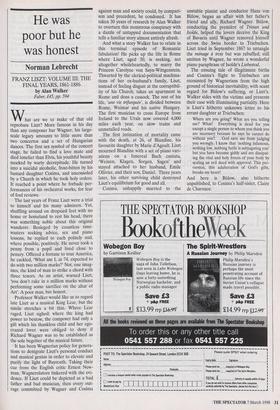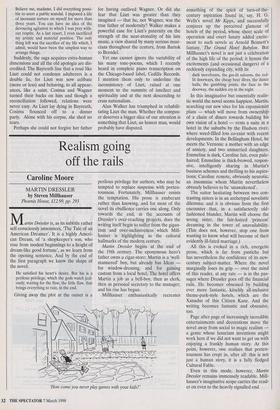He was poor but he was honest
Norman Lebrecht
FRANZ LISZT: VOLUME III: THE FINAL YEARS, 1861-1886 by Alan Walker Faber, £45, pp. 594 What are we to make of that old reprobate Liszt? More famous in his day than any composer bar Wagner, his large- scale legacy amounts to little more than two concertos and a set of Hungarian dances. The first sex symbol of the concert stage, he failed to find a love mate and died lonelier than Elvis, his youthful beauty mocked by warty decrepitude. He turned into a suicidal alcoholic, frost-bitten by his bastard daughter Cosima, and unconsoled by a Church in which he took holy orders. It reached a point where he forbade per- formances of his orchestral works, for fear of foul reviews.
The last years of Franz Liszt were a trial to himself and his many admirers. Yet, shuffling around on dropsied feet with no home or homeland to rest his head, there was something noble about this original wanderer. Besieged by countless time- wasters seeking advice, sex and piano lessons, he replied to each politely and, where possible, positively. He never took a penny from a pupil and lived close to penury. Offered a fortune to tour America, he cackled, 'What am I, at 74, expected to do with two million marks?' Not, one imag- ines, the kind of man to strike a chord with three tenors. As an artist, warned Liszt, `you don't rake in a million marks without performing some sacrifice on the altar of Art'. A poor man, but honest. Professor Walker would like us to regard late Liszt as a musical King Lear, but the simile stretches a bit thin. Where Lear raged, Liszt sighed; where the king had power to bestow, the composer had only a gift which his thankless child and her ego- crazed lover were obliged to deny if Richard Wagner was to be established as the sole begetter of the musical future.
It has been Wagnerian policy for genera- tions to denigrate Liszt's personal conduct and musical genius in order to elevate and purify the light of Bayreuth. Taking their cue from the English critic Ernest New- man, Wagnerolators tinkered with the evi- dence. If Liszt could be depicted as a bad father and bad musician, then every out- rage committed by Wagner and Cosima against man and society could, by compari- son and precedent, be condoned. It has taken 30 years of research by Alan Walker to overturn this monstrous conspiracy with a dazzle of untapped documentation that tells a familiar story almost entirely afresh.
And what a story Walker has to relate in this terminal episode of Romantic fabulation! He picks up the life in Rome where Liszt, aged 50, is seeking, not altogether wholeheartedly, to marry the Princess Carolyne von Sayn-Wittgenstein. Thwarted by the clerical-political machina- tions of her ex-husband's family, Liszt, instead of feeling disgust at the corruptibil- ity of his Church, takes an apartment in Rome and dons a cassock. The rest of his life, `une vie trifurquee', is divided between Rome, Weimar and his native Hungary. The first musician to cross Europe from Ireland to the Urals now covered 4,000 miles each year, on slow trains and unmetalled roads.
The first intimation of mortality came with the death, at 26, of Blandine, his favourite daughter by Marie d'Agoult. Liszt mourned Blandine with a set of piano vari- ations on a funereal Bach cantata, `Weinen, Klagen, Sorgen, Sagen' and stayed attached to her husband, Emile 011ivier, and their son, Daniel. Three years later, his other surviving child destroyed Liszt's equilibrium for good and all.
Cosima, unhappily married to the unstable pianist and conductor Hans von Billow, began an affair with her father's friend and ally, Richard Wagner. Billow, conducting the premiere of Tristan and Isolde, helped the lovers deceive the King of Bavaria until Wagner removed himself across the Swiss border to Triebschen. Liszt tried in September 1867 to untangle the ménage a trois but was rebuffed; still smitten by Wagner, he wrote a wonderful piano paraphrase of Isolde's Liebestod.
The ensuing tale of illegitimate births and Cosima's flight to Triebschen are recounted by Wagnerians from the high ground of historical inevitability, with scant regard for Billow's suffering, or Liszt's. Walker sides with the victims and presents their case with illuminating partiality. Here is Liszt's hitherto unknown letter to his errant daughter at Triebschen:
Where are you going? What are you telling me? What! Everything is dead for you except a single person to whom you think you are necessary because he says he cannot do without you?. .. God save me from judging you wrongly. I know that 'nothing infamous, nothing low, nothing futile is subjugating you' but you have become giddy and are dissipat- ing the vital and holy forces of your body by sealing an evil deed with approval. This per- version, this adulteration of God's gifts, breaks my heart!
And here is Billow, also hitherto unpublished, to Cosima's half-sister, Claire de Charnace: Believe me, madame, I did everything possi- ble to avert a public scandal. I imposed a life of incessant torture on myself for more than three years. You can have no idea of the devouring agitation to which I was prey with- out respite. As a last resort, I even sacrificed my artistic and material position. The only thing left was the sacrifice of my life which, I admit, would have been the simplest way to arrange things.
Suddenly, the saga acquires extra-human dimensions and all the old apologia are dis- credited. The Bayreuth line that a roué like Liszt could not condemn adulterers is a double lie, for Liszt was now celibate (more or less) and behaving, to all appear- ances, like a saint. Cosima and Wagner turned their backs on him and though a reconciliation followed, relations were never easy. As Liszt lay dying in Bayreuth, Cosima flounced off to a dinner party. Alone with his corpse, she shed no tears.
Perhaps she could not forgive her father for having outlived Wagner. Or did she fear that Liszt was greater than they imagined — that he, not Wagner, was the true father of modernity? Walker makes a powerful case for Liszt's paternity on the strength of the near-atonality of his late music, a view shared by many serious musi- cians throughout the century, from Bartok to Brendel.
Yet one cannot ignore the variability of his many tone-poems, which I recently heard in complete piano transcription on the Chicago-based label, Cedilla Records. I mention them only to underline the inconsistency of Liszt, raised at one moment to the summits of intellect and spirituality and at the next descending to crass nationalism.
Alan Walker has triumphed in rehabili- tating Liszt the man. Whether the compos- er deserves a bigger slice of our attention is something that Liszt, an honest man, would probably have disputed.



























































 Previous page
Previous page